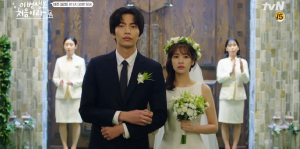 Because This Is My First Life focused heavily on social issues in its first four episodes, dealing with heavy topics like patriarchy and adverse working conditions in South Korea. The series juggled the portrayals of interpersonal expressions of sexism, as well as institutional and economic barriers to success, packaged in k-drama cliches. Plotting moved at an impressive pace to propel the main characters from innocent cohabitation to fake marriage.
Because This Is My First Life focused heavily on social issues in its first four episodes, dealing with heavy topics like patriarchy and adverse working conditions in South Korea. The series juggled the portrayals of interpersonal expressions of sexism, as well as institutional and economic barriers to success, packaged in k-drama cliches. Plotting moved at an impressive pace to propel the main characters from innocent cohabitation to fake marriage.
Yoon Ji-ho (Jung So-min) has been through a rollercoaster of life-changing moments in a short space of time. She’s been evicted, pushed out of her job, assaulted, and now is compelled to marry due to external circumstances. With the main narratives set, the next four episodes have less external antagonistic factors pushing the characters into decisions and deal with the internal fallout of their choices.
The wedding of Nam Se-hee (Lee Min-ki) and Ji-ho is motivated by the need for acceptance from their family and society. Ji-ho and Se-hee need to convince others of the authenticity of their relationship to be accepted as a couple. For the auxiliary characters, this means persuading them of their love. The supporting cast is less fleshed out than the main pair and fall easily into character tropes. For Yang Ho-rang (Kim Ga-Eun) the prospect of love initially is a believable sequence of events, while for Ma Song-goo (Park Byung-eun) any expression of physical approval for Ji-ho from Se-hee is interpreted as love.
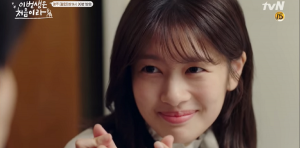
The themes of myth-making and disillusionment — particularly as they relates to love and marriage — are introduced through these episodes. The characters all struggle with what they expect to happen versus reality. Ji-ho’s narration explaining the mindset of the 1988 generation is a key point for the premise of the series. Her sometimes irrational optimism and the devastating fallout of every disappointment is, for her, a hallmark of her generation, not an individual singularity. This self-characterization is commonplace as people in their twenties and early thirties are referred to as the “seven-give-up generation”. The “seven give-ups” are love, marriage, childbirth, human relations, home ownership, personal dreams, and hope. While all the characters are seen in some ways to face the difficulties that would lead them to give up these things, Ji-ho is pushed mostly to give up on her dreams.
Ji-ho’s conflicts with her mother, Kim Hyun-ja (Kim Sun-young) touch on issues of class aspiration and the question of whether achievements are codified according to wealth. Ji-ho’s journey has been one of striving towards goals that have been thwarted, but she has not reached rock bottom. Her and Hyun-ja’s fears that they are alike are shared by both women yet expressed very differently.
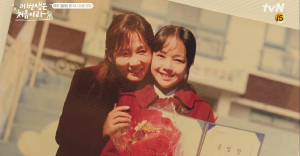
Ji-ho’s desperation to remain in Seoul makes sense considering the income-inequality faced by people in rural areas in South Korea. Her character’s disillusionment mirrors that of many young people in similar positions. The drama’s writing and Jung So-min’s acting adds realistic dimension to the stock Cinderella persona. Her outbursts that she has nothing to offer in her marriage resembles the social commentary of the “Hell Joseon” variety while her mother’s response is also generationally typical. Hyun-ja expects Ji-ho to tough it out and make something of herself to make up for the sacrifices she made.
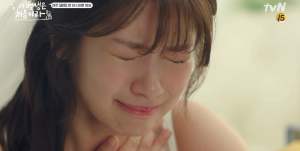
Ji-ho’s loss of optimism is compounded when her tentative attempts to create what she considers an ideal married life are rejected. The fantasy of a marriage bound by shared responsibility and mutual support is created through the magnification of Se-hee’s use of the word “our” and his reluctant acceptance of Ji-ho’s gestures of attachment. Once Se-hee reaffirms his boundaries with Ji-ho, her anger at being denied any of her desires is an optimistic sign for the future because she is not apathetic about her situation.
While the relationships of the supporting cast face challenges and disappointments, an antagonist to Se-hee and Ji-ho’s partnership alters their dynamic with danger. Yeon Bok-nam (Kim Min-kyu) is immediately flirtatious with Ji-ho in ways we are often implicitly told in k-dramas are romantic. He’s second-lead material in that he’s handsome, emotionally present, and helps her despite being a violent stalker.
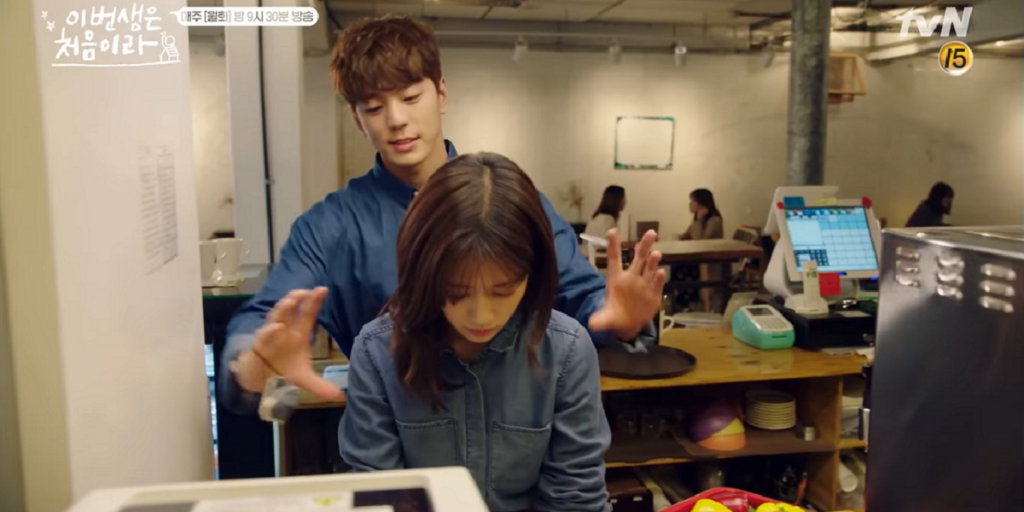
Bok-nam’s character not-so-subtly follows the normalized high-handed behavior of romantic interests in k-dramas. His disregard of the personal boundaries Ji-ho sets is filmed to center her discomfort and doesn’t allow the story to take the turn that she will positively respond to his persistence. Romantic perseverance here is not coded as “not taking no for an answer” as it has been in other dramas. Bok-nam’s insensitivity to Ji-ho’s explicitly expressed wishes is a warning sign that he is not to be trusted. The series doesn’t employ the stereotypical depiction of a stalker as a skulking, unattractive creep, but rather as a socially-adept manipulator. Bok-nam notices what he perceives as weakness in Ji-ho and targets her because of it. He uses his looks and affability to control people around him.
Se-hee’s interactions with Bok-nam serve the dual purpose of bringing his character closer to Ji-ho and humanizes him in the eyes of the viewer. Whether Se-hee’s concern for Ji-ho is romantic or not is somewhat ambiguous. Based on his previous actions, he could have decided to check on her out of compassion and decency. The visual motif of Se-hee’s reaching his hand out to hers and use of the words “our house” was previously employed at the wedding, and led to Ji-ho’s misunderstanding of his intentions. The emphasis placed on the care he shows his cat and the deliberation he takes solving a Rubik’s cube suggests this character’s every decision is intentional. Ji-ho also explained her connection with those words so this could be interpreted as Se-hee acknowledging a development in their relationship.
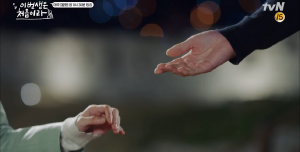
Because This Is My First Life continues to deliver a dose of realism when dealing with romantic expectations and stereotypes. The weighty topics are deftly handled, so they don’t overwhelm the series with a somber tone. Although the characters are placed in absurd situations, their reactions and portrayals feel authentic and human. Ji-ho, Se-hee and their friends are sometimes flawed, selfish and unrealistic in their expectations but that makes them seem all the more real.
(The Korea Times, East Asia Forum, The Washington Post, Images courtesy of TVN)


